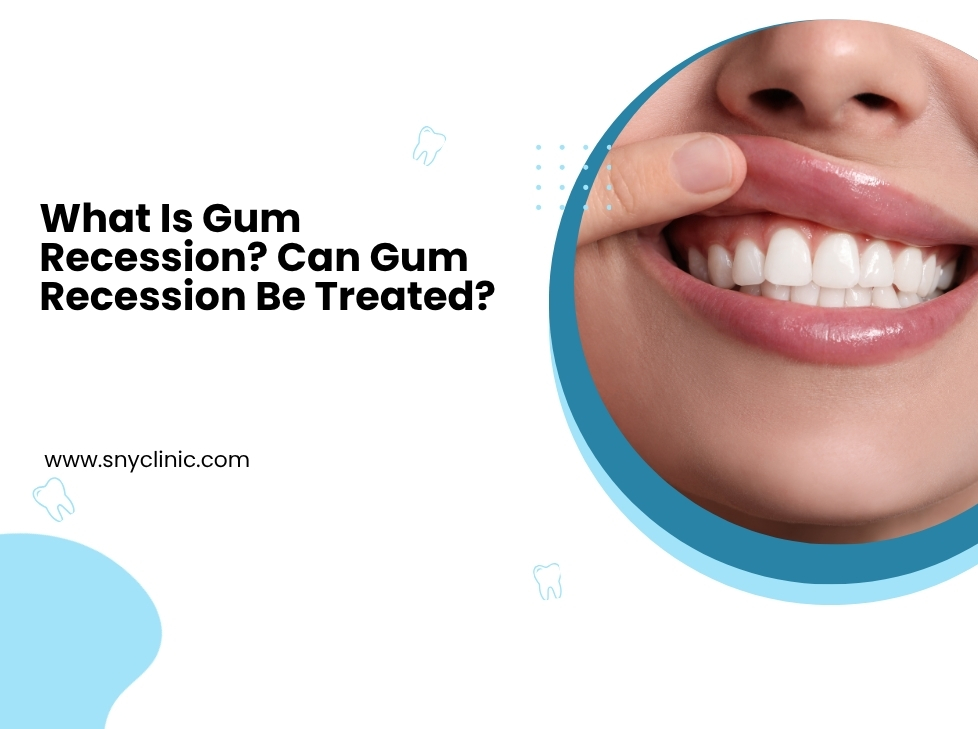What Is Gum Recession? Can Gum Recession Be Treated?

What Is Gum Recession? Can Gum Recession Be Treated?
What Is Gum Recession? Can Gum Recession Be Treated?
Gum recession is a common oral health problem that occurs when the gums gradually recede over time, exposing the tooth roots. It is generally a slow-progressing condition that can lead to serious consequences such as tooth loss if left untreated. With early diagnosis and proper treatment methods, gum recession can be controlled and its progression stopped.
In this article, we will examine in detail the causes, symptoms, treatment methods, and preventive measures for gum recession.
What Is Gum Recession?
Gum recession occurs when the gum tissue surrounding the tooth recedes, exposing the tooth root. Healthy gums tightly surround and protect the teeth. However, when these tissues are damaged for various reasons, the gums begin to recede backward. As a result, the roots of the teeth become exposed to external factors, sensitivity increases, and aesthetic issues may occur.
Gum recession is not only an aesthetic issue but can also damage the bone tissue supporting the teeth. Therefore, early diagnosis and intervention are extremely important.
Causes of Gum Recession
There are many different causes of gum recession. Some of the most common include:
1. Gum Diseases
Periodontal diseases are the most common cause of gum recession. Gum inflammation begins with the accumulation of bacterial plaque and, if left untreated, can lead to gum recession and even bone loss.
2. Incorrect Brushing Technique
Using overly hard toothbrushes or brushing the teeth too aggressively can damage the gums. Over time, this can cause them to recede.
3. Genetic Factors
Some people naturally have thin or sensitive gum tissue. In such cases, even with proper oral hygiene, the risk of recession is higher.
4. Teeth Grinding (Bruxism)
The habit of grinding or clenching teeth, especially at night, puts excessive pressure on the gums, leading to gum recession over time. This habit is often related to stress.
5. Poor Oral Hygiene
Irregular brushing, neglecting flossing, and skipping regular dental check-ups can lead to plaque and tartar buildup, causing inflammation and recession of the gums.
6. Smoking and Tobacco Use
Smoking reduces blood flow to the gums, slowing tissue regeneration. This accelerates gum recession.
7. Hormonal Changes
Hormonal changes during pregnancy, puberty, or menopause can make gums more sensitive, increasing the risk of recession.
Symptoms of Gum Recession
Since gum recession usually progresses slowly, it may not be noticed in the early stages. However, if the following symptoms are observed, a dentist should be consulted immediately:
- Teeth appearing longer than usual
- Sensitivity to cold, hot, or sweet foods
- Redness or swelling along the gum line
- Bleeding gums
- Formation of gaps between the teeth and gums
- Bad breath (halitosis)
- Loose teeth
These symptoms may indicate advanced gum disease and, if left untreated, can lead to irreversible damage.
Can Gum Recession Be Treated?
Yes, gum recession can be treated. However, the method of treatment depends on the cause and severity of the condition. If detected early, gum recession can usually be managed without the need for surgical intervention.
1. Professional Scaling (Deep Cleaning)
If gum recession is caused by plaque and tartar buildup, professional cleaning by a dentist can control the condition. This removes bacteria and helps the gums heal naturally.
2. Medication Treatments
If inflammation or infection is present, the dentist may recommend antibacterial mouthwashes or topical medications to help repair the gum tissue.
3. Gum Graft Surgery (Gingival Graft)
In advanced cases, a surgical procedure known as a gum graft may be performed. In this procedure, healthy tissue is taken from the palate and attached to the receded area. This covers the exposed root and restores the gum’s natural appearance.
4. Pinhole Surgical Technique
This modern technique involves making a small hole in the gum and repositioning the tissue upward. It does not require stitches and offers a shorter healing time.
5. Bruxism Treatment
If gum recession is caused by teeth grinding, the use of a night guard is recommended. This transparent appliance reduces the pressure on the teeth and gums.
How to Prevent Gum Recession
Gum recession is largely preventable. By maintaining daily oral care and proper habits, it is possible to preserve gum health. Here are some key tips:
- Brush gently with a soft-bristled toothbrush.
- Use fluoride toothpaste.
- Clean between the teeth regularly using dental floss or interdental brushes.
- Avoid smoking and tobacco products.
- Visit your dentist regularly (at least every 6 months).
- Use a night guard if you grind your teeth.
- Eat foods rich in vitamin C and calcium.
Remember, even if gum recession is treated, consistent oral care is necessary to prevent recurrence.
Aesthetic and Psychological Effects of Gum Recession
Gum recession affects not only oral health but also aesthetics. Teeth appearing longer than normal can negatively impact the appearance of a smile. When it occurs on the front teeth, it can cause loss of confidence.
Thanks to modern aesthetic dentistry techniques, gum levels can be corrected, and a natural smile can be restored. Cosmetic dental treatments can reshape the color, contour, and alignment of the gums for a balanced and harmonious appearance.
Early Intervention Is Everything
If left untreated, gum recession is a serious issue that can lead to tooth loss. However, when detected early, it can be treated easily, preventing permanent damage.
Maintaining oral hygiene, adopting proper brushing techniques, and attending regular dental check-ups can help prevent gum recession.
Healthy gums are the foundation of strong teeth. Therefore, if you notice any changes in your gums, consult your dentist without delay.
Recent Blog
1.
Top 10 Most Frequently Asked Questions About Dental Health
2.
What Is Gum Recession? Can Gum Recession Be Treated?
3.
Smile Design: Duration, Process, and Stages
4.
Orthodontic Treatment Process in Adolescents
5.
Can Dental Problems Cause Headaches?
Categories
Smile Design 0
Implant Treatment 2
Teeth Whitening 1
Prosthodontics 0
Aesthetic Dentistry 0
Zirconium 0
Porcelain (Leaf) Laminates 0
Full Porcelain Crowns 0
Prosthetic Dentistry 0
Removable Prostheses 0
Implant Prostheses 0
Transparent Plate (Invisalign) Treatment 0
Dental Fillings 0
Endodontics and Root Canal Treatment 0
Periodontology 0
Gum Treatments 1
Oral and Maxillofacial Surgery 0
Dental Diagnosis and Radiology 0
Pedodontics (Child Dentistry) 0
Digital Dentistry 0
20 Year Old Teeth 0
Tooth Extraction 0
Dental Trauma and Treatments 0
Conscious Sedation 0
Apikale Resektion 0
Tooth Abscess 0
Cyst Operations 0
Preprosthetic Surgery 0
Frenectomy 0




